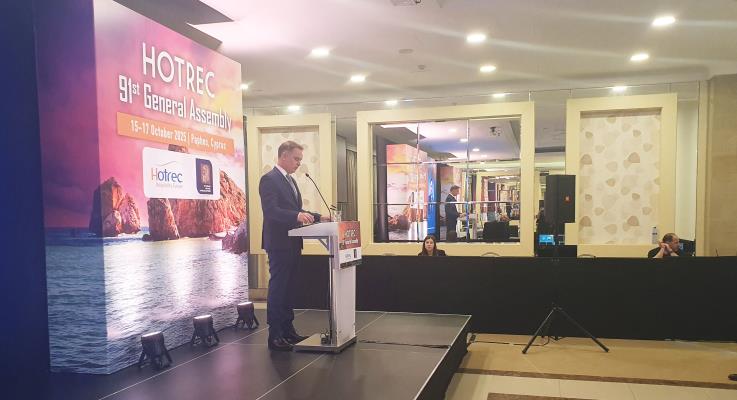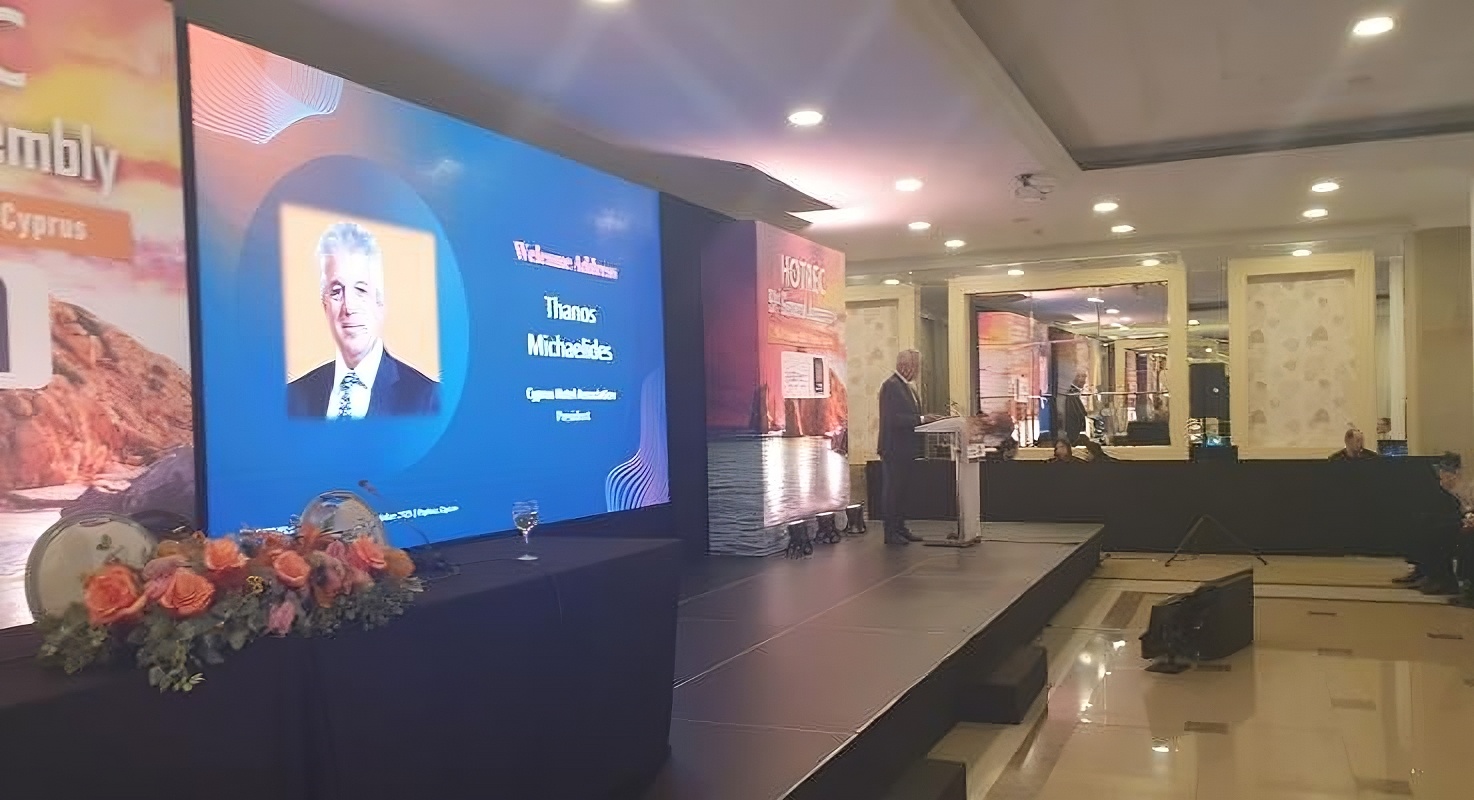Digital and green transition essential for hospitality sector
Cyprus hoteliers association (Pasyxe) president on Friday Thanos Michaelides described the 91st HOTREC general assembly in Paphos, which the association is hosting, as a crucial forum.
HOTREC is a forum “where we can both draw knowledge and be able to cope with the new directives that will come in the future,” Michaelides said.
He stated that it is “a great honour that Cyprus, and specifically Paphos, is hosting HOTREC”, particularly in view of Cyprus’ presidency of the Council of the European Union, which begins in January 2026.
“It is a great opportunity for us to show what Cyprus is, and what Cyprus offers, while at the same time discuss the issues that HOTREC president Alexandros Vassilikos mentioned, which, especially in a small state like Cyprus, are of great importance,” Michaelides added.
When asked, Michaelides stated that all problems in the tourism industry are common to everyone, adding, however, that the difference is the size.
“Cyprus is a smaller member state, so the problems for us are the same but on a smaller scale,” he explained.
Michaelides also used his address to state that “Cyprus is a country with a deeply rooted tradition of hospitality, a place where culture, sun, sea, and authentic experiences are harmoniously interwoven”.
Paphos, a UNESCO World Heritage Site and one of Europe’s most historic coastal cities, is the ideal backdrop for their discussions, as “it is a city that combines timeless history with modern tourist infrastructure and is dynamically evolving as a year-round destination,” he continued.
“However, behind the impressive numbers and positive forecasts, deep and persistent challenges remain”, Michaelides cautioned.
“Foremost among these”, he stressed, “is the lack of labour and skills, a phenomenon that has intensified in the post-pandemic era.”
“This is not merely a Cypriot or European issue but a global reality,” he pointed out.
He also emphasised that “tourism and hospitality are growing rapidly, fuelled by greater interconnectivity and the democratisation of travel”.
“Across Europe, however, the demand for specialised professionals now exceeds supply,” he said.
The Pasyxe president added that the traditional “safety valve” of labour migration from third countries is beginning to be limited, as emerging economies strengthen their own tourism infrastructure and retain their talent.
In this new reality, Michaelides said, “the cost of labour is rising and profit margins are being squeezed, forcing us to redefine the way we work and the incentives we offer”.
In addition, he said that 2024 was rightly characterised as a year of reskilling and upskilling.

“We must continue to empower our people to embrace technology and artificial intelligence as valuable tools that enhance, not replace, the human element,” he stated.
“In essence, hospitality is and will remain a deeply human affair,” he explained.
Our teams, he continued, “are on the frontline of the visitor experience: not only as service providers, but as storytellers, hosts, and ambassadors of our destinations’ culture.”
He pointed out that “another issue that continues to shape our business environment is the rising cost of energy and food, a result of ongoing geopolitical tensions”.
“This is a serious reminder of how vulnerable our economies remain and how vital it is to build resilience through sustainability,” he stressed.
“In Cyprus,” he said, “we have not yet fully exploited one of our greatest natural advantages: abundant solar energy.”
“There is huge potential for decentralised production of renewable energy sources, not only to protect our businesses from external shocks, but also to achieve our environmental goals,” he stated.
“Production, however, is only one part of the solution,” he added. “Smart energy consumption, waste reduction, and digital management must become the new operating standard across the sector, supported by infrastructure upgrades and long-term government policy.”
“The transition we are experiencing is twofold, green and digital, and both of these dimensions are necessary and transformative,” he stated.
Regarding sustainability, Michaelides said that “we must move beyond formal certifications”.
“We must substantially improve waste, water, and resource management, investing in long-term, meaningful solutions rather than superficial interventions,” he mentioned.
“At the same time,” he said, “the digital transformation of hospitality is rapidly accelerating.”
“From operations and visitor experience to marketing and distribution, technology is redefining every aspect of our business,” he added.
However, many small and medium-sized enterprises (SMEs) in Europe still, he explained, lag behind in accessing new technologies due to financial or knowledge constraints.
“This asymmetry between SMEs and large companies creates an increasingly uneven business environment,” he said.
At this point, he continued, organisations like HOTREC are called to play a crucial role. This involves supporting political initiatives, encouraging cooperation, and ensuring that all hospitality businesses, regardless of size, can prosper.
“HOTREC remains for us a valuable field for dialogue, knowledge exchange, and collective advocacy,” he emphasised.
“In times of transformation and uncertainty, we need a strong, unified voice at the European level that reflects the needs of businesses, our people, and our communities,” he added.
Earlier during the day, HOTREC president Alexandros Vassilikos confirmed that critical issues would be addressed during the two-day assembly.
These issues, he said, include coordinating representation actions and forming common positions on matters concerning development and innovation in the hospitality sector.
“We have the platforms which concern us, we live in an economy which has been globalised, in which there are big players who control the markets,” Vassilikos said to journalists on the sidelines of the assembly.
He added that it is “very important to have a balance in the market through European legislation”.
Short-term rentals are also, he said, an issue that “concerns us at the European level and we have done a great deal”.
“In addition, the lack of human resources is also a concern for all their members due to a European demographic situation that generally complicates the situation,” he stated.






Click here to change your cookie preferences